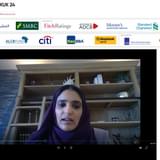Egypt’s Financial Supervisory Authority has outlined regulations governing the issuance of covered bonds. The move is part of an effort to develop Egypt’s capital markets and diversify the country’s non-bank related financial instruments.
The country has recently suffered from underinvestment. “A sovereign has to create the right environment for its economy to grow, including ventures such as investing in infrastructure,” said Hiren Singharay, a Member of the Supervisory Board at Global Finance and Capital Limited.
“In the past, Egypt had a strong infrastructure network, stable government and high levels of literacy, however this changed after the Arab Spring in 2011. Although Egypt still has many of these factors, political stability has gone, which has kept investors away,” he added.
Singharay also noted that Egypt is running out of dollars, and without substantial oil reserves, will not be able to sell much to raise foreign currency.
Zeinab Hashim, CEO and Managing Director at ADIB Egypt said covered bonds are a good financial instrument for funding as they provide an alternative form of financing for companies instead of bank loans and securitization, which needs a special purpose vehicle (SPV) requiring many procedures to set up.
“[They] are a very important thing for our market and bring the Egyptian capital market more in line with other global financial markets,” Hashim noted.
But she said it would take time for corporates to gain full understanding of the advantages and disadvantages of this type of financing before they start to have an impact on the Egyptian economy.
“Covered bonds will have an impact. Foreign entities will be able to invest in Egypt,” stated Singharay, noting that the “vultures will land” – in reference to yield hungry investors.
However, he added that if any problems arose, removing any funds could prove problematic.
Egyptian corporates currently rarely tap the markets. Last year, roughly 90% of bonds issued in the country came from the government.









